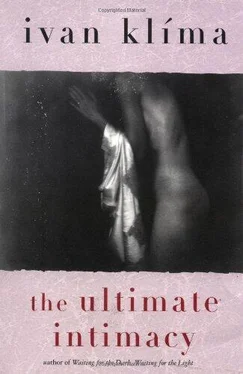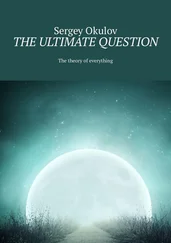Ivan Klima - The Ultimate Intimacy
Здесь есть возможность читать онлайн «Ivan Klima - The Ultimate Intimacy» весь текст электронной книги совершенно бесплатно (целиком полную версию без сокращений). В некоторых случаях можно слушать аудио, скачать через торрент в формате fb2 и присутствует краткое содержание. Год выпуска: 1998, Издательство: Grove Press, Жанр: Современная проза, на английском языке. Описание произведения, (предисловие) а так же отзывы посетителей доступны на портале библиотеки ЛибКат.
- Название:The Ultimate Intimacy
- Автор:
- Издательство:Grove Press
- Жанр:
- Год:1998
- ISBN:нет данных
- Рейтинг книги:3 / 5. Голосов: 1
-
Избранное:Добавить в избранное
- Отзывы:
-
Ваша оценка:
- 60
- 1
- 2
- 3
- 4
- 5
The Ultimate Intimacy: краткое содержание, описание и аннотация
Предлагаем к чтению аннотацию, описание, краткое содержание или предисловие (зависит от того, что написал сам автор книги «The Ultimate Intimacy»). Если вы не нашли необходимую информацию о книге — напишите в комментариях, мы постараемся отыскать её.
The Ultimate Intimacy — читать онлайн бесплатно полную книгу (весь текст) целиком
Ниже представлен текст книги, разбитый по страницам. Система сохранения места последней прочитанной страницы, позволяет с удобством читать онлайн бесплатно книгу «The Ultimate Intimacy», без необходимости каждый раз заново искать на чём Вы остановились. Поставьте закладку, и сможете в любой момент перейти на страницу, на которой закончили чтение.
Интервал:
Закладка:
period. This did not worry him too much as he tended to seek knowledge in books which he had either acquired earlier, before they were removed from the libraries, or which he borrowed from the professors who had fallen out of favour.
He had counted on remaining in the faculty after graduating, or going to work at the Oriental Institute, but there was no vacancy for him in either place, and he was offered a job in the press agency instead. He regarded it as demotion, but in spite of his liking for Lao Tzu's teachings, the outside world held a deep attraction for him and he enjoyed travelling, observing and discovering, so he took the job. He also translated poetry and wrote verse himself: not about love, but about nature — the mood of a rainy day, about nostalgia and loneliness, about equanimity and spiritual calm. He wrote it in the style of ancient Chinese poetry or of the Japanese haiku:
October again.
Leaves wilt.
From the slate-grey sky, lethargy now falls.
He managed to get several poems printed in magazines, although his efforts to have a collected edition published came to nothing. All the same he regarded himself as an artist; he believed he would make a name for himself one day as a poet. Then he would change his lifestyle, stop going out to work and devote himself to study and meditation, and maybe travel. However, for years he lacked everything necessary for such a lifestyle, namely, status, contacts, total freedom to travel — and money.
His visits to the nurses' station where he would tell the nurses all about his experiences in foreign parts were motivated more by loneliness than a desire to please. His illness depressed him, that and the fact that his wife Klára had left him.
When he first met her, Klára was a waitress in a little bistro where he would sometimes go for a meal. He found her physically attractive (although she was quite ordinary: bleached hair and varnished nails, and if she spoke for more than a minute it was tediously banal) but she had no sympathy for Chinese philosophy and poetry, and on the one occasion he had tried to explain to her the contrast between the forces of yin and yang she had fallen asleep. All the same, Klára herself set
store by the fact that Matouš was a graduate and had seen a lot of the world. She was also taken by his flat, particularly the room in which the blades of a wooden fan rotated slowly beneath the ceiling and where there was a glass case and shelves full of the most unusual objects, such as purple-coloured receptacles for crickets, old-fashioned Chinese tiles or statues of the Buddha, some of them gilded. What most attracted Klára, who handled dozens of cups and saucers made of the cheapest and heaviest china, were the tiny tea cups of translucent porcelain decorated with exotic paintings of flowers and birds. When she first picked them up and felt their fragility, the very touch of them sent a thrill through her. They must have been not only rare but expensive too. Klára came to the conclusion that Matouš was wealthy as well as interesting.
Shortly before their first meeting, his mother had died unexpectedly (unexpectedly from the medical point of view, but as in the case of his father he had previously observed a fading aura above his mother's head), so he needed someone to take over the household duties and generally to attend to the practical questions of his existence. So he imprudently asked Klára if she would like to be his wife.
The marriage had lasted almost seven years. It continued now, in fact, as Klára had not divorced him and would put in an appearance at least once a month to ask him for money. He was always short of cash, and he could see no reason why he should pay her, as she didn't live with him and they had no children. The trouble was she would start to yell and heap reproaches on him until, in the end, she extracted some small sum from him.
Although he was nearly fifty, Klára was his first and only wife. He had lived with his mother until her death and during that time had had a few fleeting acquaintances with married women, all of them older than himself. Klára was different from them. Not only was she unmarried, she was also fifteen years his junior. She had been looking for a love affair, whereas he was hoping for a housekeeper rather than a lover. In his view, Klára was typical of the kind of modern women who looked after their own bodies first and foremost and wanted to dominate men. That was why they went after good-hearted fellows or preferably fools. Then they expected to be spoiled and supported, be given expensive gifts and lots of money to spend on new clothes and shoes, and later on with their lovers.
Even though little in Matous's life turned out as planned, his
marriage had turned out worst of all. But whose marriage ever turns out well anyway? He was determined that once he was divorced — which would definitely happen in the foreseeable future — he would not marry again, unless he happened to come across a woman that resembled his mother (should such a woman exist at all) or one who was rich and sufficiently generous to enable him to fulfil his plans to become an independent artist and philosopher. Never having met such a woman, he was able to talk non-committally to those in whom he had no interest, and even entertain them with interesting stories.
The hospital nurses genuinely enjoyed listening to him. His life seemed to teem with any number of exciting experiences, exotic cities, abrupt reversals of fortune, dust storms, fascinating encounters, Buddhist monasteries, oriental gambling dens, night-time hold-ups and other situations where it was a matter of life or death, or at least honour. Many of the stories in which he himself featured he had only heard or read about, or dreamt up. But he wasn't a liar, just an inveterate story-teller, and anyway he didn't attach any great importance to the stories (after all there was little difference between what actually happened and what could have happened) and as soon as he had borrowed them and retold them, he believed them himself. He definitely dijd not make it all up, however. During his life, he had travelled a good part of the globe and spent a total of more than two years in China. He had lived through the end of the Cultural Revolution, the death of Chairman Mao and the unexpected thaw at the end of the 1970s.
He found that great country quite different from the one he read about in the books of the ancient sages, yet at the same time he found much of what he expected: the Chinese theatre, music and drawing, and the regime and the government seemed to enjoy greater authority than what he was accustomed to back home. He found there curiosity, superstition, immense poverty and hospitality, as well as fanaticism and astonishing licence. There were lots of colourful costumes on festive occasions and drab uniform-like clothes on work days. He saw a good deal of the country: enormous cities, the valleys of great rivers and the mountains of the north, but there was much he did not see because, as a dog-eyed foreigner, he was not allowed to go everywhere, and besides, the country was too vast for anyone to visit the whole of it in a single lifetime.
He also managed to get as far as New Zealand, where he was able to
hear the Maori tongue and to experience more than the average citizen of the free world, let alone of a country like Czechoslovakia where every foreign journey was a privilege, or at least an exception. His attitude to life's problems and to people was particularly influenced by his experiences in those countries where neither modern civilization nor Communist dictatorship had managed to wipe out traditional relationships and rituals.
From his travels he would send back stories to the illustrated magazines. In them he would argue that when civilization reached as far as the little islands in the South China Sea, it broke down traditional values without offering anything new in their place. Oriental thinking had always stressed that man was part of nature and was distrustful of theories that sought to separate man from the natural cycle. Christianity and Islam were seen to be retrograde steps in that respect, particularly since what vanquished the local traditions were not the values of the Ten Commandments, the Sermon on the Mount or the Sura of the Nocturnal Path, but the false values of consumerism. While missionaries, whether Christian or Muslim, arguably brought a spiritual message (though often they would have done better to accept it themselves rather than force it on others), the traders who came with them, or even preceded them, offered more attractive commodities — strictly for this life not the hereafter: transistor radios, televisions, cars and medicines that cured people the witch doctors or traditional medicine couldn't help. Admittedly all that was available only to a few, but the possibility was open to everyone. And the people paid for it with their countries' natural wealth and the traditions by which they had lived for thousands of years. Superficially it looked as if prosperity had come to those parts, whereas in fact they had been overrun by poverty, both material and spiritual.
Читать дальшеИнтервал:
Закладка:
Похожие книги на «The Ultimate Intimacy»
Представляем Вашему вниманию похожие книги на «The Ultimate Intimacy» списком для выбора. Мы отобрали схожую по названию и смыслу литературу в надежде предоставить читателям больше вариантов отыскать новые, интересные, ещё непрочитанные произведения.
Обсуждение, отзывы о книге «The Ultimate Intimacy» и просто собственные мнения читателей. Оставьте ваши комментарии, напишите, что Вы думаете о произведении, его смысле или главных героях. Укажите что конкретно понравилось, а что нет, и почему Вы так считаете.






![Theresa Cheung - The Dream Dictionary from A to Z [Revised edition] - The Ultimate A–Z to Interpret the Secrets of Your Dreams](/books/692092/theresa-cheung-the-dream-dictionary-from-a-to-z-r-thumb.webp)





